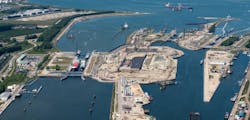View from the Top: UN-Accenture study shows CEOs deeply wary of Climate Change, Pollution and Health Impacts
Money talks but the storm clouds gather.
Inflation and price volatility are still the biggest global challenges facing most companies today, but climate change, environmental pollution and public health threats are highly impactful concerns for a majority of them, according to a survey of more than 2,600 corporate leaders from around the world.
The 12th annual United Nations Global Compact-Accenture CEO Study shows that C-suite leaders believe the COVID-19 pandemic, geopolitics and the climate crisis have erased years of progress on improving inequalities economically and the food system.
First up, of course, is economics, as a combined 91 percent of global CEOs responded that inflation was having high or moderate impacts on their businesses. Sixty-nine percent of those company heads hold the same concerns about climate change, while 57 percent see high or moderate impact from air, water and land pollution.
Threats to public health actually featured as the second biggest concern, just behind inflation and barely ahead of climate change. Those biggest challenges are all inter-connected, many CEOs believe.
“Today, we must face discrete challenges, with the added complexity of the interlinkages between these challenges,” Thomas Burerl, CEO of global insurer AXA, said as quoted in the UN-Accenture report. “The climate crisis will only make things worse.”
Earlier this week the U.S. National Oceanic and Atmospheric Administration reported that 18 extreme climate events caused more than $165 billion in damage last year. Overall, 2022 was the third worst year in terms of financial impact from weather events in the nation.
So why the U.S. statistics are concerning, vastly more deadly consequences from climate change are being felt elsewhere in poorer regions, according to statistics. As noted in the UN-Accenture report, 91 percent of global deaths from natural disasters since 1991 have occurred in developing countries, according to the World Meteorological Organization’s 2021 tabulation.
More than half of CEOs questioned noted insufficient and degrading infrastructure as an immediate and continuing challenge. Many engineering and utility forecasts have noted the aging grid as a detriment to the net zero aims of the planned energy transition.
Nearly half of the CEOs queried by the survey think that biodiversity loss, mostly due to climate change, is concerning. Only one in five, however, saw it as a risk to their businesses.
Nonetheless, a whopping 98 percent of CEOs surveyed believe it is their responsibility to help make their companies more sustainable. This nearly unanimous consensus rose from 83 percent in 2013, according to the UN-Accenture report.
More than half of those industries employing the CEOs have launched new sustainability products or services.
“These days, sustainability is an integral part of doing business,” Bertrand Schmitt, CEO of BDR Thermea Group, said as quoted by UN-Accenture’s report. “CEOs must be able to discuss and implement a full sustainability agenda.”
One of the most popular methods to achieve those goals is by digitizing processes, some 72 percent of the CEOs responded. A slightly higher margin, 74 percent, indicated that upskilling and reskilling their company’s workforce for the future was a key objective.
Among the CEOs surveyed and personal interviewed include top leaders from companies such as American Express, ADM, Cisco, Bristol-Myers Squibb, Johnson Controls, S&P Global, Kokusai Kogyo Co., Sumitomo Chemical, Verizon, Vatterfall, Tata Motors and Progreso, among dozens of others.
-- -- --
(Rod Walton, senior editor for EnergyTech, is a 15-year veteran of covering the energy industry both as a newspaper and trade journalist. He can be reached at [email protected]).
Follow us on Twitter @EnergyTechNews and @rodwaltonelp and on LinkedIn.





